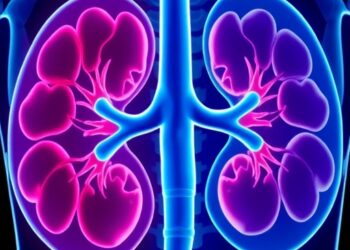(WASHINGTON, June 21, 2024) – Patients with chronic lymphocytic leukemia (CLL) and non-Hodgkin lymphomas (NHLs) who received frequent tests for immunoglobulin G (IgG) were less likely to experience severe infections compared with those who didn’t, according to a study published in Blood Advances. Moreover, only half of patients undergo such testing.
(WASHINGTON, June 21, 2024) – Patients with chronic lymphocytic leukemia (CLL) and non-Hodgkin lymphomas (NHLs) who received frequent tests for immunoglobulin G (IgG) were less likely to experience severe infections compared with those who didn’t, according to a study published in Blood Advances. Moreover, only half of patients undergo such testing.
Patients with blood cancers such as CLL and NHL are at elevated risk for potentially life-threatening infections due to low blood levels of immunoglobulins — proteins that help the immune system fight off infections. As many as one-half of patients with CLL and a third of those with NHL die from infection complications.
Studies have shown that immunoglobulin replacement therapy (IgRT) reduces both recurrent and severe infections, potentially saving patients’ lives. In the present study, those who received IgRT had fewer infections, required fewer antimicrobial medications, and had higher blood levels of IgG, the most common type of immunoglobulin, following the administration of IgRT.
“This is the first large, real-world study to examine current practices in IgG testing and the use of IgRT among patients with CLL and NHL,” said Jacob D. Soumerai, MD, assistant professor of medicine at Massachusetts General Hospital Cancer Center and Harvard Medical School and the study’s lead investigator. “Our most striking finding is that real-world practice is highly variable. We found that many patients are not tested for IgG deficiency, and IgRT is often not given despite the development of recurrent infections.” Moreover, frequent IgG testing is associated with a reduction in subsequent development of severe infections, he added.
For the study, Dr. Soumerai and his colleagues analyzed medical records of 17,192 adult patients treated for CLL (3,920) or NHL (13,232) at one of eight affiliated hospitals in the Boston area between 2010 and 2023. Median patient follow-up in the database was four and a half years. The patients’ de-identified data was obtained from the Mass General Brigham Research Patient Data Registry. The average patient age was 66; 58% were male and 90% were white. Among patients with NHL, 51.2% underwent IgG testing and 4.7% received IgRT; among those with CLL, 67% received IgG testing and 6.5% were treated with IgRT.
Among patients who received at least one IgG test, the researchers compared blood levels of IgG, the proportion of patients with IgG levels below 500 mg/dL (deemed low), the rate of infections, and the use of antimicrobial medications at three, six, and 12 months before and after the first time each patient received IgRT. The results were similar across patient subgroups (e.g., males vs. females), blood cancer type, and type of treatment received.
Dr. Soumerai and his colleagues also found that increased IgG testing is associated with a significantly lower risk of subsequently developing severe infection. After adjusting for potential confounders, patients with CLL and NHL who had three or more preceding IgG tests had 92% and 86% lower odds of later developing a severe infection, respectively.
“Within each disease cohort, patients with three or more IgG tests were more likely to have low IgG detected and also more likely to receive IgRT,” said Dr. Soumerai. “These findings suggest that patients known to have low levels of IgG might be more likely to communicate recurrent minor infections to their hematologists, leading to improved IgRT use.”
Although clinical guidelines from various professional medical societies generally recommend IgG testing, specific recommendations regarding when and how often patients should be tested vary widely and, as the study revealed, IgG testing practices vary among hematologists caring for patients with CLL and NHL. In both patient cohorts, the number of IgG tests per patient spanned a wide range, with many patients not receiving any IgG testing during the study period. “This underlines the urgent need to establish clear consensus on best practices for IgG testing and IgRT use in patients with CLL and NHL, to reduce recurrent infections in our patients,” Dr. Soumerai said.
This study is limited in that it is retrospective and only included patients treated in the Mass General Brigham health care system; it did not capture patients who may have received IgRT outside of this network. Furthermore, most of the patients in the registry were white and thus not fully representative of the U.S. population.
The study was funded by Takeda Pharmaceuticals USA, Inc. Several study authors are employed by Takeda or by companies providing paid consulting services to Takeda.
###
Blood Advances (bloodadvances.org) is an online, open access journal publishing more peer-reviewed hematology research than any other academic journal worldwide. Blood Advances is part of the Blood journals portfolio (bloodjournals.org) from the American Society of Hematology (ASH) (hematology.org).
Journal
Blood Advances
Article Title
Reduced Infections Seen in CLL and NHL Patients Undergoing Immunoglobulin Testing and Replacement Therapy
Article Publication Date
21-Jun-2024




